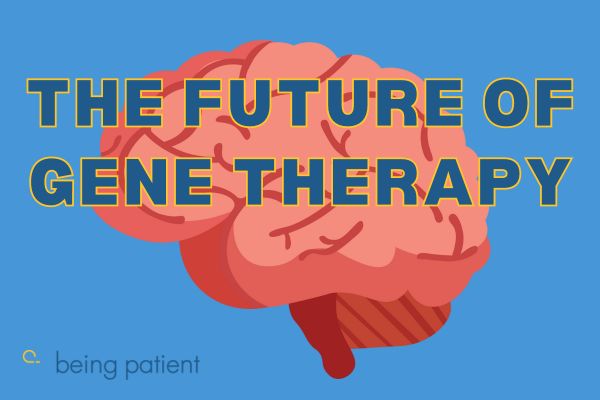ApoE4. PSEN1. PSEN2. Some genes drive Alzheimer’s risk. Here’s how genetic testing is shaping dementia diagnosis, treatment, and prevention strategies — and how to decide if it’s right for you.
When Jamie Tyrone opened the e-mail from a direct-to-consumer DNA company, she thought she was satisfying a casual curiosity. Instead, she learned she carries two copies of APOE4 — a genotype linked to a 14-fold jump in lifetime Alzheimer’s risk. “Alzheimer’s wasn’t even on my radar, even though it ran in my family,” she told Being Patient. “My father, grandmother, great grandmother and two great uncles had Alzheimer’s.”
Tyrone’s story exemplifies how a person digging into the details of their genetics can be a double-edged sword: The knowledge a person gleans from a genetic test can be frightening, but it can also lead to a combination of earlier disease diagnosis, proactive lifestyle changes, and early-stage treatments that wouldn’t have been possible a decade ago. With the FDA now approving drugs designed to slow — if only modestly — Alzheimer’s progression, understanding whether you carry “Alzheimer’s gene” ApoE4 has never held more potential.
‘The Alzheimer’s Gene:’ 5 People With ApoE4 on Plans for the Future
Disease-modifying drugs and the new role of genetics in diagnosis
In July 2023, the FDA granted full approval to a new kind of Alzheimer’s drug called Leqembi (lecanemab) — a monoclonal antibody (“mab” drug) that clears toxic beta-amyloid from the brain and has been shown to slow cognitive decline by a small amount. “This approval will be a catalyst for driving further developments and investments in the Alzheimer’s pipeline,” Dr. Howard Fillit of the Alzheimer’s Drug Discovery Foundation told Being Patient. https://www.beingpatient.com/alzheimers-drug-faq-what-is-lecanemab/
A year after Leqembi’s approval, approval of another anti-amyloid mab drug, Kisunla (donanemab), followed, administered via a once-monthly infusion with the possibility of stopping treatment after amyloid disappears on brain scans.
Both therapies, however, come with a safety catch: They can cause ARIA, a form of brain swelling or micro-bleeding that is three times more common in people who have one or two copies of the ApoE4 gene than in people who don’t.
That reality has pushed genetics into the diagnostic front line. According to behavioral neurologist Dr. Marwan Sabbagh, every Leqembi or Kisunla work-up for his patients now includes a quick blood test for the APOE gene: “If you’re not an ApoE4 carrier, your risk of progression to dementia is six percent per year,” he told Being Patient. “If you’re an ApoE4 carrier, it’s 17 percent — a significant predictor of future decline.”
Leading Neurologist: This Gene Raises Your Risk of Alzheimer’s—and Drug Side Effects
While ApoE4 is known as the “Alzheimer’s gene,” it doesn’t guarantee a person will develop Alzheimer’s. It just raises their chances. But for families that carry deterministic mutations — genes that all but guarantee the onset of Alzheimer’s within a person’s lifetime like PSEN1, PSEN2 or APP—genetics carries even greater weight.
Michele Castro comes from one such family. She learned her genetic status through a blood test. “The results came back that I, too, had the PSEN1 genetic mutation, which was not the news that I wanted to hear, but I was prepared to hear it if that was,” she told Being Patient.
Should you get a genetic test?
While genetic testing can give a person indications about their future likelihood of developing Alzheimer’s and other genetic diseases, it isn’t a crystal ball. And the information a person learns from such a test could prove to be more stressful than it is actionable. For these reasons among others, experts warn genetic testing isn’t necessarily right for everyone.
Virginia Tech bioethicist Dr. Doris Zallen urges would-be testers to slow down. “Preparation is key,” she told Being Patient. “You have to think about whether the testing is right for you. You don’t get a yes-or-no answer; you get a risk, a probability, and that probability changes over time.”
Zallen advised weighing family history, insurance needs and emotional readiness. Long-term care insurers, for example, may be able to legally raise premiums or deny coverage if a genetic result appears in a medical record.
Research psychologist Dr. Jessica Langbaum also advises approaching the idea with caution: With proper counseling, “learning your ApoE results is safe and well-tolerated,” she told Being Patient — but the resulting anxiety spikes can last for months before subsiding. Tyrone wishes she had known this before her genetic testing experience: “If I’d had a genetic counselor, I probably would’ve chosen not to be tested.” she said.
Considering a genetic test?
Zallen recommends clarifying asking questions like why you would want the information. When to secure long-term care insurance? And who or how are the results being delivered?
Marty Reiswig, whose extended family carries a deterministic PSEN2 mutation, offers another approach: “I choose not to test,” he said. “I live as if I have [this early-onset Alzheimer’s genetic marker], staying healthy and joining observational studies so researchers can learn from my data.”
Life-changing Genes: ‘I Could Have A 50% Chance of Getting Alzheimer’s By 50’
Lifestyle still matters
Neurologist Dr. Richard Isaacson stressed that even if a person carries an Alzheimer’s risk gene, lifestyle interventions can still have benefits. “While there is no magic bullet,” Isaacson said, “we believe that one out of every three cases of Alzheimer’s may be preventable.” For example: Exercise boosts blood flow; a Mediterranean-style diet cools inflammation; quality sleep clears amyloid; stress-reduction tamps down cortisol spikes that damage memory circuits.
Beyond lifestyle interventions, new advances in treatment are on the horizon. And advocates want to see the drug development community double down on these efforts: “Now that we can slow Alzheimer’s a little, it’s time to widen the search for the next generation of therapies and to practice precision prevention for everyone at risk,” Fillit said.
For some, the stress of knowing one’s fate may do more brain health harm than good. Meanwhile, for families like Tyrone’s and Castro’s, hereditary information is painful but also empowering. Tyrone, once paralyzed by her double-E4 result, now tracks her steps, follows the MIND diet and meditates daily. “Knowledge gave me fear first,” she says, “but then it gave me a roadmap.”




